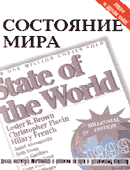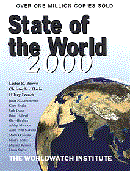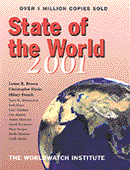 |
 |
 |
|
Состояние мира 1999
Доклад института Worldwatch о развитии по пути к устойчивому
обществу
Перевод с английского
Москва, "Весь Мир", 2000.
384 страницы
|
State of the World 2000
A Worldwatch Institute Report on Progress
Toward a Sustainable Society
W.W.Northon & Co.
New York & London, 2000,
262 pages
|
State of the World 2001
A Worldwatch Institute Report on Progress
Toward a Sustainable Society
W.W.Northon & Co.
New York & London, 2001,
275 pages
|
Доклады института Всемирной вахты (Worldwatch Institute)
"Состояние мира" о глобальных тенденциях развитии по пути
к устойчивому обществу издаются ежегодно с 1984 года. Доклад Состояние
мира 1999 был переведен на русский язык и вышел в Москве
в 2000 году, но к настоящему времени имеются уже два следующих выпуска
доклада на английском языке: Состояние мира 2000 и
Состояние мира 2001.
Институт Всемирной вахты - один из наиболее авторитетных
независимых научных центров мира, изучающих глобальные проблемы
развития человеческой цивилизации - экономические, социальные, демографические,
экологические.
Содержание
Перечень таблиц и рисунков
Предисловие
Браун Л. Р., Флейвин К. Новая экономика для нового столетия
Флейвин К., Данн С. Создание новой энергетической системы
Гарднер Г., Сампат П. Выковывание устойчивой материальной
экономики
Абрамович Дж. Н., Маттун Э. Т. Переориентирование экономики
производства лесной продукции
Макгинн А. П. Дать Мировому океану новый путь развития
Таксил Дж. Оценка преимуществ биоразнообразия растений
Браун Л.Р. Накормить девять миллиардов
О'Меара М. Каким быть городу будущего?
Реннер М. Прекращение вооруженных конфликтов
Рудмэн Д. М. Построение устойчивого общества
Примечания
Предметный указатель
Contents
Acknowledgments
List of Tables and Figures
Foreword
1. Challenges of the New Century Lester R. Brown
- Environmental Trends Shaping the New Century
- Replacing Economics with Ecology
- Crossing the Sustainability Threshold
- Crossing the Decline Threshold
- Two Keys to Regaining Control of Our Destiny
2. Anticipating Environmental "Surprise" Chris
Bright
- Tropical Rainforests: The Inferno Beneath the Canopy
- Coral: Death in the Warming Seas
- The Atmosphere: An Invisible Confluence of Poisons
- An Agenda for the Unexpected
3. Redesigning Irrigated Agriculture Sandra Postel
- Mounting Water Deficits
- The New Water Wars
- The Productivity Frontier
- Expanding Irrigation to Poor Farmers
- The Policy Challenge
4. Nourishing the Underfed and Overfed Gary Gardner and
Brian Halweil
- A Malnourished World
- The Roots of Hunger
- The Creation of Overeating
- Diet and Health
- Societal Costs of Poor Diet
- Nutrition First
5. Phasing Out Persistent Organic Pollutants Anne Platt
McGinn
- The World of POPs
- Routes of Exposure and Environmental Fate
- Health Consequences
- The Policy Response to POPs
- Retooling Regulations, Business, and Agriculture
6. Recovering the Paper Landscape Janet N. Abramovitz
and Ashley T. Mattoon
- The Paper Landscape
- Uncovering the Costs of Paper
- Reducing the Burden of Production
- Trimming the Costs of Consumption
- Designing a Sustainable Paper Economy
7. Harnessing Information Technologies for the Environment Molly
O'Meara
- An Expanding Global Network
- Squandering or Saving Natural Resources?
- Monitoring and Modeling
- Networking for Sustainable Development
- Information Tools for a Healthy Planet
8. Sizing Up Micropower Seth Dunn and Christopher Flavin
- Miniaturized Machines
- Cool Power
- Is Smaller Better?
- Remaking Market Rules
- How Far, How Fast?
9. Creating Jobs, Preserving the Environment Michael
Renner
- The World of Work
- Boosting Resource Productivity
- Environment Policy: Job Killer of Creator?
- Restructuring Energy, Creating Jobs
- Durability and Remanufacturing
- Shifting Taxes
- Rethinking Work
10. Coping with Ecological Globalization Hilary French
- Trading on Nature
- The WTO Meets the Environment
- Greening the International Financial Architecture
- Innovations in Global Environmental Governance
Notes
Index
Contents
Acknowledgments
List of Tables and Figures
Foreword
1. Rich Planet, Poor Planet Christopher Flavin
- A table of Two Worlds
- Testing the Limits
- Seizing the Moment
- North Meets South
2. Uncovering Groundwater Pollution Payal Sampat
- Valuing Groundwater
- Tracking the Hidden Crisis
- The Slow Creep of Nitrogen
- Pesticides on Tap
- The Pervasiveness of Volatile Organic
- Compounds
- The Threat of Natural Contaminants
- Changing Course
3. Eradicating Hunger: A Growing Challenge Lester R.
Brown
- A Hunger Report: Status and Prospects
- Raising Cropland Productivity
- Raising Water Productivity
- Restructuring the Protein Economy
- Eradicating Hunger: The key Steps
4. Deciphering Amphibian Declines Ashley Mattoon
- Why Amphibia?
- Beyond the Declines
- Reconceiving the Science
- Protecting Amphibians
5. Decarbonizing the Energy Economy Seth Dunn
- The Climate Constraint
- From solid to liquid Gas
- Improving Energy Intensity
- Beyond Fossil Fuels
- Entering the Hydrogen Age
- Deliberate Decarbonization
6. Making Better Transportation Choices Molly O'Meara
Sheehan
- From Sledge to Jet
- Current Transport Trends
- The Costs of Mobility
- Clearing the Air
- Diversifying Our Options
- Identifying Bottlenecks
7. Averting Unnatural Disasters Janet N. Abramovitz
- Counting Disasters
- Ecological Vulnerability
- Social Vulnerability
- The Politics and Psychology of Disasters
- Fostering Resilience in Nature and Communities
8. Ending the Debt Crisis David Malin Roodman
- Costs of Crisis
- The Year of Jubilee
- Debt History
- Sources of the Official Debt Crisis
- Adjusting to Reality
- Lending, Development, and Accountability
9. Controlling International Environmental Crime Hilary
French and Lisa Mastny
- The Treaty Landscape
- Species at Risk
- Cracking Down on Dumping
- Atmospheric Assaults
- From Words to Action
10. Accelerating the Shift to Sustainability Gary Gardner
- Anatomy to change
- Empowering the Base: The Role of Civil Society
- Greening Commerce: The Role of Business
- Building Coalitions: The Role of Government
- Accelerating Cultural Evolution
Notes
Index
|

